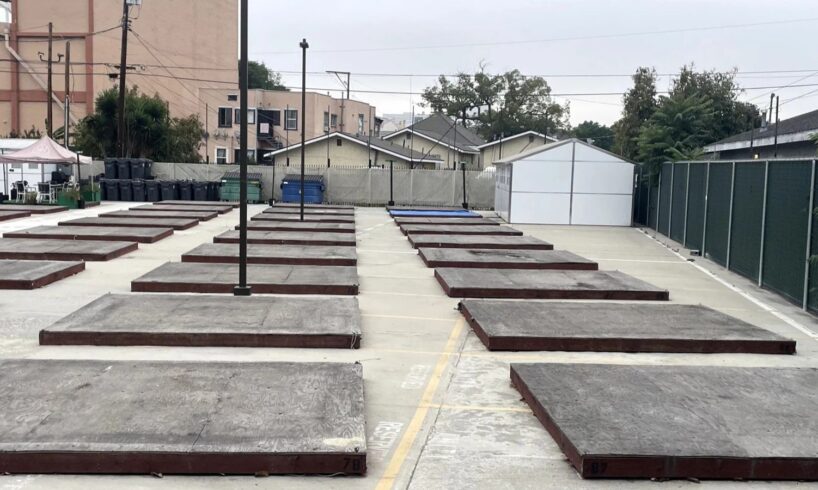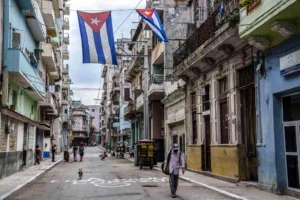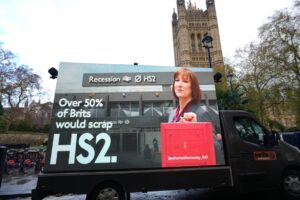
Last April, the City of Los Angeles reported to a district court that the Lincoln Safe Sleep Village, a homeless site in South Los Angeles, had 88 beds, but when a court-appointed monitor checked in June, she found only 44. The site, a makeshift campground on parking lots adjacent to the abandoned Lincoln Theater, is run by the nonprofit Urban Alchemy, which holds a $2.3 million contract to operate it.
Los Angeles Homeless Services Authority (LAHSA) Commissioner Justin Szlasa took a photo of the unused part of the site when he visited Lincoln Safe Sleep Village in May 2025. [Photo: Justin Szlasa via LAist]
During the June inspection, Michele Martinez, the special master overseeing the federal settlement, saw gray tents pitched on only one of the two lots. The other lot had 44 bare wooden platforms with no tents at all. The discrepancy prompted U.S. District Judge David O. Carter to sharply question city attorneys at a November court hearing, calling the situation “obvious fraud” and criticizing the city for failing to properly verify whether the shelter’s reported capacity matched reality.
Urban Alchemy responded by explaining that it removed tents after being warned by city officials in April 2024 about looming budget cuts. That notice reduced its annual contract from $3.1 million to $2.3 million. Even so, the Los Angeles Homeless Services Authority (LAHSA) renewed the contract for this fiscal year in May at the same 88-bed level. It was not until July that LAHSA adjusted publicly reported capacity down to 46 “spaces” and the contract was later amended to a $1.2 million payment. By then, the discrepancy had already been exposed.
LAHSA Commissioner Justin Szlasa visited the site earlier this year before a vote on $400 million in new homeless services contracts. He noted the city was paying for the 88 slots even though many were unused and argued that the system needs stronger verification to ensure that what is on paper actually exists on the ground.
At the same time that Los Angeles is paying millions for phantom shelters, Los Angeles County is proposing deep cuts to its homeless services.
In a budget draft released earlier this month, the county plans to eliminate or drastically reduce funding for several key programs, effective July next year. The cuts include closing 20 of 30 Pathway Home sites, more than 700 beds total, reducing county street outreach staff in half, eliminating LAHSA’s housing navigation program, cutting all county homelessness prevention funding, including case management, removing $12 million for legal and job services and ending funding for all four of the county’s Safe Parking locations.
County officials argue that they are facing a “large projected deficit” in homeless services. Revenue from Measure A, the county’s dedicated sales tax for homelessness, has come in below projections; meanwhile, temporary federal and state funding is expiring even as operational costs rise.
Ultimately, homelessness has become a business model, and the entire political establishment supports the exploitation of misery for the enrichment of a few.
Urban Alchemy, the “safe sleep” operator, gets paid millions of dollars to operate sites like Lincoln. According to a LAHSA commissioner who inspected the site, $186 was paid per night per tent occupant, by his calculation, for a program billed as “low-cost, high impact.”
Urban Alchemy is typical of a private-nonprofit homelessness industry that has grown rich on public dollars while delivering minimal transparency and no significant social improvement. The organization won contracts in recent years to run outreach teams, safe-sleep villages and “ambassador” programs. Though the group touts its employment of formerly incarcerated people, it has also faced scrutiny for financial mismanagement.
LAHSA and the city have built and protected a system that enriches contractors while failing to alleviate the crisis. LAHSA leadership has faced repeated investigations for failing to report fraud, financial mismanagement, inappropriate staff spending and data manipulation. Former LAHSA CEO Va Lecia Adams Kellum approved more than $2 million in contracts to a nonprofit where her husband held a top role.
The city shields the system from scrutiny, spending nearly $6 million on corporate lawyers to resist independent oversight. After years of litigation, it ultimately funded the monitor anyway, wasting millions to defend political reputations.
Mayor Karen Bass’s Inside Safe program, celebrated as a humane alternative to sweeps, costs $6,900 per participant per month. Funds allocated towards Inside Safe do not create permanent housing or expand social services but flow through hotels, providers, consultants and security firms.
The establishment claims high costs reflect complexity or needed flexibility, but audits and court filings reveal the absence of mechanisms which ensure that public funds work out solvable problems. The issue is not only inadequate funding but a system structured to channel money to politically connected contractors.
LAHSA is responsible for distributing hundreds of millions of dollars in homeless services contracts. City officials, editorial boards, media and business groups promote proposals to dissolve or weaken the agency, claiming its bureaucracy is responsible for the crisis.
This campaign includes Democratic Socialists of America–aligned City Council members, who in March backed a major step toward dismantling LAHSA. Presented as an effort to “streamline” services, the measure shifts control of hundreds of millions of dollars from a public body (however dysfunctional) to the same network of private contractors already profiting from this disaster.
LAHSA is unquestionably inadequate, but this inadequacy stems from a homelessness response designed around privatization and contract outsourcing through political connections. Weakening or dissolving LAHSA will not improve oversight; It will further empower the private interests extracting wealth from the crisis.
This scandal at Lincoln Safe Sleep Village is the logical endpoint of a system where homelessness has become an industry that redirects public money into private contractors, real estate interests and nonprofit executives with little transparency and almost no accountability.
Homelessness in Los Angeles is neither natural nor accidental. In a city dominated by speculative real estate, luxury development and financialized housing, the working class faces impossible conditions. Rents outpace wages while evictions occur on a mass scale and social programs have been dismantled over decades. At the same time, homelessness has become an industry, transferring billions in public dollars into private hands.
The crisis cannot be solved through contracts, nonprofits or police operations. It requires social reorganization based on human need rather than corporate gain. Los Angeles has vast private wealth and thousands of vacant luxury units in a real estate market serving global investment. What is missing is a political program treating housing as a right rather than a profit vehicle.
A socialist approach would abolish the homelessness industry, establish democratic public control over housing, convert empty units into public housing and redirect funds now flowing to contractors into lasting social infrastructure.
Join the Socialist Equality Party!
The Socialist Equality Party is organizing the working class in the fight for socialism: the reorganization of all of economic life to serve social needs, not private profit.





